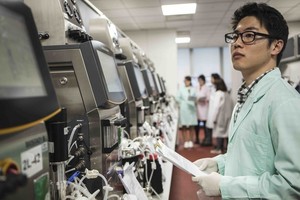According to the US Food and Drug Administration (FDA), a biosimilar is a biological product shown to be ‘highly similar to an FDA-approved biological product’, and which ‘has no clinically meaningful differences in terms of safety and effectiveness’. Only minor differences in clinically inactive components are allowable in biosimilars. Biosimilars of approved biologicals at the end of their patent life are expected to cost less but be as safe and effective for licensed clinical uses. To date, FDA has approved four biosimilars [1], while the European Union has approved more than 20 biosimilars [2].
Analytical comparability plays a critical role in the regulatory approval process. Authors from the DBT Center of Excellence for Biopharmaceutical Technology, Indian Institute of Technology, demonstrate this with an evaluation of physicochemical and functional comparability of five approved granulocyte colony-stimulating factor (G-CSF) biosimilars to the originator biological (Neupogen) in the Indian marketplace [3]. The analysis is carried out using an array of advanced analytical methods for the detection of changes in protein structure, identity, purity and bioactivity. The results offer robust evidence for the structural and biological similarity of the G-CSF biosimilars with the originator biological through a comprehensive analytical comparability exercise that can significantly reduce the chances of failure in preclinical and clinical trials.
Each sample of G-CSF biosimilar and originator biological was independently measured using reverse-phase chromatography electrospray ionization mass spectrometry (RPC-ESI-MS) for intact mass analysis and peptide mapping confirming primary structure, far ultraviolet circular dichroism spectrometry (UV CD) for determining secondary structure, sodium dodecyl sulphate-polyacrylamide gel electrophoresis (SDS-PAGE), size-exclusion chromatography (SEC), and RPC for product-related impurities assessing purity and in vitro cell proliferation assay for assessing relative potency.
The only anomaly identified was in three of the biosimilars, which were found to have a typical variant found in the RPC profile, which has been previously reported as an oxidized variant. Further investigation using ESI-MS revealed the occurrence of doubly-charged envelopes and RPC with fluorescence detection (RPC-FLD) showed multiple fluorescence peaks with a shift in the maximal wavelength (λmax), which was found to be due to a conformational variant. This type of assessment is part of a set of comparisons required to determine whether a follow-on biological is highly similar to an existing product, so that a ‘clinically meaningful’ difference between the two does not exist.
In the next phase of the work, the authors plan to compare a monoclonal antibody biosimilar to the corresponding originator biological. Monoclonal antibodies are the largest class of approved protein therapeutics today and the ability to extend analytical platform approaches to this class would represent an important landmark in their analytical characterization. The effort is expected to assess the quality of monoclonal antibodies biosimilars in the Indian market as well as present best practices for such exercises in analytical comparability.
Conflict of Interest
The authors of the research paper [3] did not provide any conflict of interest statement.
Abstracted by Professor Anurag S Rathore, PhD, Department of Chemical Engineering;
Coordinator, DBT Center of Excellence for Biopharmaceutical Technology,
Indian Institute of Technology, New Delhi, India.
Related articles
EMA opens consultation on revision of biosimilar G-CSF guideline
No relevant difference in ADRs from biosimilars and originators
References
1. GaBI Online - Generics and Biosimilars Initiative. Biosimilars approved in the US [www.gabionline.net]. Mol, Belgium: Pro Pharma Communications International; [cited 2016 Nov 25]. Available from: www.gabionline.net/Biosimilars/General/Biosimilars-approved-in-the-US
2. GaBI Online - Generics and Biosimilars Initiative. Biosimilars approved in Europe [www.gabionline.net]. Mol, Belgium: Pro Pharma Communications International; [cited 2016 Nov 25]. Available from: www.gabionline.net/Biosimilars/General/Biosimilars-approved-in-Europe
3. Nupur N, Singh SK, Narula G, Rathore AS. Assessing analytical comparability of biosimilars: GCSF as a case study. J Chromatogr B Analyt Technol Biomed Life Sci. 2016;1032:165-71.
Permission granted to reproduce for personal and non-commercial use only. All other reproduction, copy or reprinting of all or part of any ‘Content’ found on this website is strictly prohibited without the prior consent of the publisher. Contact the publisher to obtain permission before redistributing.
Copyright – Unless otherwise stated all contents of this website are © 2016 Pro Pharma Communications International. All Rights Reserved.








 0
0











Post your comment